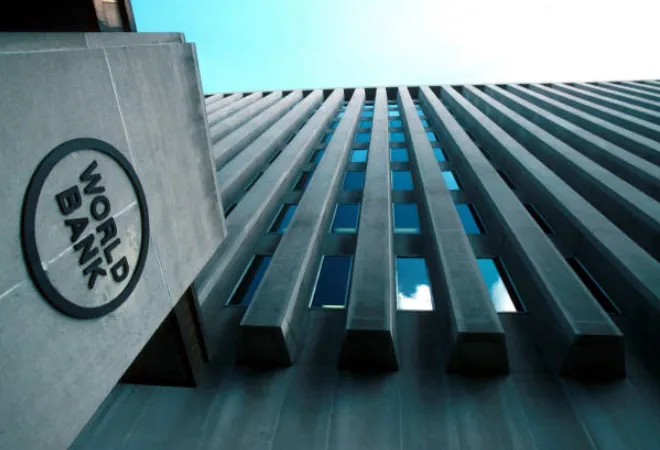
In September 2021, the World Bank (WB) cancelled its prominent ‘Doing Business’ report, which ranked countries on the basis of their domestic business regulations; a higher rank indicated a better and improved business environment. The report was discontinued due to allegations of data irregularities, which helped manipulate China’s rankings in the publication. WilmerHale, a law firm based in the US, was commissioned to conduct an external review of the circumstances leading to this moment, and scrutinised over 80,000 documents, and interviewed current and former WB officials during its investigation. The final report implicated some of WB’s top leadership, casts deep suspicion upon the integrity and credibility of Multilateral Development Banks (MDBs), and points to the growing political influence of China over major MDBs.
WilmerHale’s report investigates data irregularities associated with the 2018 and the 2020 iteration of the ‘Doing Business’ report. The events preceding the publication of the 2018 edition reveals the immense behind-the-scenes pressure asserted by Chinese government officials to improve its ranking. For instance, Chinese government officials repeatedly expressed concerns to then WB President Dr Jim Yong Kim and then CEO, Dr Kristalina Georgieva, that the 2018 ranking did not accurately reflect the economic reforms that had taken place in the country.
More worryingly, the investigation exposed the close involvement of the key aides to President Kim, CEO Georgieva and her team, to manipulate the data to augment China’s scores. Interviews with bank officials cite that Georgieva became “directly involved in efforts to improve China’s ranking”, and chastised WB’s then Country Director for “mismanaging the Bank’s relationship with China”. Eventually, three data points were identified in the Doing Business methodology—namely, starting a business, paying taxes, and legal rights—which were revised to help move up China’s ranking from 85 to 78. The change was made to push the data in a certain direction to “accommodate geopolitical considerations”, given that this would play a key role in the Bank’s capital increase campaign. Coincidently, in 2018, China’s percentage shareholding in the International Bank for Reconstruction and Development (IBRD)—a lending arm of WB—rose by nearly a third, from 4.68 percent to 6.01 percent. This development was the result of negotiations where the WB secured a 13 billion USD increase in capital from countries, in return for reforms to reduce lending to middle-income countries—a policy change that would impact China, and needed its acquiescence.
The final report implicated some of WB’s top leadership, casts deep suspicion upon the integrity and credibility of Multilateral Development Banks (MDBs), and points to the growing political influence of China over major MDBs.
Presently, Kristalina Georgieva is a managing director at the International Monetary Fund (IMF)—a position that, amongst other things, entails the responsibility to protect the IMF against political meddling. However, Georgieva—who disagreed with the findings of the report and denied all allegations—will continue to occupy this crucial position. The IMF Executive Board, which was responsible for reviewing the allegations, issued a statement saying that report “did not conclusively demonstrate” that she played an “improper role”, and reaffirmed its full faith in her leadership. News reports indicate that while US and Japan were keen on Georgieva’s dismissal, the other European powers expressed support for her continued engagement with the IMF. The US administration has been unhappy with this development, with US Treasury Secretary Janet Yellen consistently declining to engage Georgieva over calls.
The WB data manipulation controversy has cast a shadow of doubt on the integrity, credibility, and impartiality of international financial organisations. This is particularly worrying for MDBs and International Financial Institutes (IFIs), who—amongst other economic activities—publish reports that are relied upon widely by countries to assess the reputation, perception, and impact of their domestic policies. While some analysts question the appropriateness of the methodology used in these reports, the integrity and sanctity of the data is rarely ever challenged.
The incidence of political influence on international organisations is not new; many scholarly works have been undertaken to examine the role and influence of the US on multilateral organisations. For instance, a 2003 book titled “US Hegemony and International Organizations” asserts that given US’ unique position in the world order, multilateral institutions will continue to function within the “direct and indirect constraints of US instrumentalism”. Though the underlying objective of international organisations is to function with independence and impartiality, it is acknowledged that countries mostly use multilateral institutions as instruments to achieve their own objectives. As the chief architect of various multilateral organisations and IFIs—including the Bretton Woods institutions—the US has played this role more than any other country in the world. This state of affairs was symptomatic of the inherent imbalance in decision-making before major MDBs, and many countries—like India—repeatedly called for vote-share reforms and quota increases through the years.
The WB data manipulation controversy has cast a shadow of doubt on the integrity, credibility, and impartiality of international financial organisations.
However, the WB data manipulation controversy demonstrates a critical shift in this status quo—that, perhaps, US influence over MDBs is on a steady decline. China’s rise and growth as an economic powerhouse comes as a direct challenge to US’ dominance over MDBs. A recent report by ODI provides a detailed analysis of China’s growing role in development finance and global economic governance. Noting China’s shift from being a borrower to a creditor, the report states that Beijing recognises that MDBs serve as a “valuable tool” to further its “geopolitical agenda”, and enhance its influence over decisions, governance, and development priorities of MDBs. Amongst some of the strategies studied, the report details how one of the methods implemented by China channels financial resources outside normal core share capital to MDBs, to increase its presence in these institutions. This can, in part, increase China’s prestige and soft power within the governance of MDBs, as well as “increase its informal influence”.
With China’s rise, it was inevitable that its role and influence over global economic governance would continue to increase; the World Bank data manipulation debacle stands as testimony to this hypothesis. Beijing seeks to assume a bigger role in global economic governance and projects itself is an important actor on the world stage. However, this episode has lasting repercussions for the reputation and strength of MDBs and IFIs. This should be considered as a call for introspection and scrutiny into what went wrong and what more can be done in the future to protect MDBs from surreptitious external influence. Reforming internal governance structures, the observance of ethical practices, and the creation of robust transparency and accountability frameworks, can provide a way forward.
The views expressed above belong to the author(s). ORF research and analyses now available on Telegram! Click here to access our curated content — blogs, longforms and interviews.




 PREV
PREV


